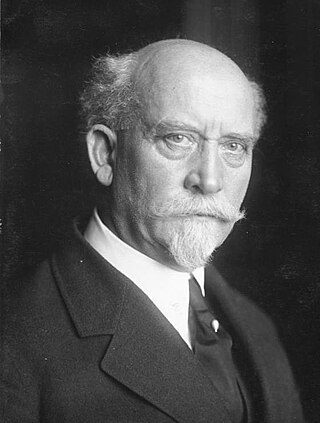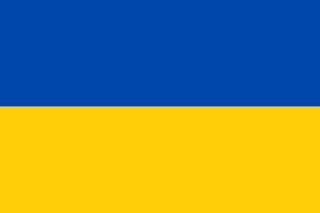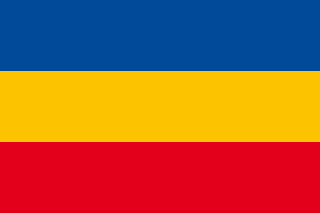Related Research Articles

The stab-in-the-back myth was an antisemitic conspiracy theory that was widely believed and promulgated in Germany after 1918. It maintained that the Imperial German Army did not lose World War I on the battlefield, but was instead betrayed by certain citizens on the home front—especially Jews, revolutionary socialists who fomented strikes and labor unrest, and other republican politicians who had overthrown the House of Hohenzollern in the German Revolution of 1918–1919. Advocates of the myth denounced the German government leaders who had signed the Armistice of 11 November 1918 as the "November criminals".
The Nazi term Gleichschaltung or "coordination" was the process of Nazification by which Adolf Hitler and the Nazi Party successively established a system of totalitarian control and coordination over all aspects of German society and societies occupied by Nazi Germany "from the economy and trade associations to the media, culture and education". Although the Weimar Constitution remained nominally in effect until Germany's surrender following World War II, near total Nazification had been secured by the 1935 resolutions approved during the Nuremberg Rally, when the symbols of the Nazi Party and the State were fused and German Jews were deprived of their citizenship.

The Nazi Party, officially the National Socialist German Workers' Party, was a far-right political party in Germany active between 1920 and 1945 that created and supported the ideology of Nazism. Its precursor, the German Workers' Party, existed from 1919 to 1920. The Nazi Party emerged from the extremist German nationalist, racist and populist Freikorps paramilitary culture, which fought against the communist uprisings in post–World War I Germany. The party was created to draw workers away from communism and into völkisch nationalism. Initially, Nazi political strategy focused on anti–big business, anti-bourgeois, and anti-capitalist rhetoric, which was later downplayed to gain the support of business leaders. By the 1930s, the party's main focus shifted to antisemitic and anti-Marxist themes. The party had little popular support until the Great Depression, where worsening living standards and vast unemployment drove Germans into political extremism.
Reich is a German noun whose meaning is analogous to the English word "realm"; this is not to be confused with the German adjective "reich" which means "rich". The terms Kaiserreich and Königreich are respectively used in German in reference to empires and kingdoms. The Cambridge Advanced Learner's Dictionary indicates that in English usage, the term "the Reich" refers to "Germany during the period of Nazi control from 1933 to 1945".

The Weimar Republic, officially named the German Reich, was a historical period of Germany from 9 November 1918 to 23 March 1933, during which it was a constitutional federal republic for the first time in history; hence it is also referred to, and unofficially proclaimed itself, as the German Republic. The period's informal name is derived from the city of Weimar, which hosted the constituent assembly that established its government. In English, the republic was usually simply called "Germany", with "Weimar Republic" not commonly used until the 1930s.

The German People's Party was a conservative-liberal political party during the Weimar Republic that was the successor to the National Liberal Party of the German Empire. Along with the left-liberal German Democratic Party (DDP), it represented political liberalism in Germany between 1918 and 1933.

The German Democratic Party was a liberal political party in the Weimar Republic, considered centrist or centre-left. Along with the right-liberal German People's Party, it represented political liberalism in Germany between 1918 and 1933. It was formed in 1918 from the Progressive People's Party and the liberal wing of the National Liberal Party, both of which had been active in the German Empire.

Reichswehr was the official name of the German armed forces during the Weimar Republic and the first years of the Third Reich. After Germany was defeated in World War I, the Imperial German Army was dissolved in order to be reshaped into a peacetime army. From it a provisional Reichswehr was formed in March 1919. Under the terms of the Treaty of Versailles, the rebuilt German army was subject to severe limitations in size, structure and armament. The official formation of the Reichswehr took place on 1 January 1921 after the limitations had been met. The German armed forces kept the name 'Reichswehr' until Adolf Hitler's 1935 proclamation of the "restoration of military sovereignty", at which point it became part of the new Wehrmacht.

Der Stahlhelm, Bund der Frontsoldaten, commonly known as Der Stahlhelm, was a German First World War veteran's organisation existing from 1918 to 1935. It was part of the "Black Reichswehr" and in the late days of the Weimar Republic operated as the paramilitary wing of the monarchist German National People's Party (DNVP), placed at party gatherings in the position of armed security guards.

German Reich was the constitutional name for the German nation-state that existed from 18 January 1871 to 5 June 1945. The Reich became understood as deriving its authority and sovereignty entirely from a continuing unitary German Volk, with that authority and sovereignty being exercised at any one time over a unitary German "state territory" with variable boundaries and extent. Although commonly translated as "German Empire", the word Reich here better translates as "realm" or territorial "reach", in that the term does not in itself have monarchical connotations.

Philipp Heinrich Scheidemann was a German politician of the Social Democratic Party of Germany (SPD). In the first quarter of the 20th century he played a leading role in both his party and in the young Weimar Republic. During the German Revolution of 1918–1919 that broke out after Germany's defeat in World War I, Scheidemann proclaimed a German Republic from a balcony of the Reichstag building. In 1919 he was elected Reich Minister President by the National Assembly meeting in Weimar to write a constitution for the republic. He resigned the office the same year due to a lack of unanimity in the cabinet on whether or not to accept the terms of the Treaty of Versailles.
Volksgemeinschaft is a German expression meaning "people's community", "folk community", "national community", or "racial community", depending on the translation of its component term Volk. This expression originally became popular during World War I as Germans rallied in support of the war, and many experienced "relief that at one fell swoop all social and political divisions could be solved in the great national equation". The idea of a Volksgemeinschaft was rooted in the notion of uniting people across class divides to achieve a national purpose, and the hope that national unity would "obliterate all conflicts - between employers and employees, town and countryside, producers and consumers, industry and craft".

Johannes Popitz was a Prussian finance minister and a member of the German Resistance against the government of Nazi Germany. He was the father of Heinrich Popitz, an important German sociologist.

The Free State of Brunswick was a state of the German Reich in the time of the Weimar Republic. It was formed after the abolition of the Duchy of Brunswick in the course of the German Revolution of 1918–19. Its capital was Braunschweig (Brunswick).

The Free State of Schaumburg-Lippe was created following the abdication of Prince Adolf II of Schaumburg-Lippe on 15 November 1918, following the German Revolution. It was a state in Germany during the Weimar Republic and Nazi Germany. The democratic government was suppressed during Nazi rule. At the end of the Second World War, the British military occupation government decreed on 1 November 1946 the union of Schaumburg-Lippe, Hannover, Braunschweig and Oldenburg to form the new state of Lower Saxony.

The Free State of Mecklenburg-Schwerin was a state in the Weimar Republic that was established on 14 November 1918 upon the abdication of the Grand Duke of Mecklenburg-Schwerin following the German Revolution. In 1933, after the onset of Nazi rule, it was united with the smaller neighbouring Free State of Mecklenburg-Strelitz to form the new united state of Mecklenburg on 1 January 1934.

The Free State of Lippe was created following the abdication of Prince Leopold IV of the Principality of Lippe on 15 November 1918, following the German Revolution. It was a state in Germany during the Weimar Republic and Nazi Germany. After the end of the Second World War, the Control Commission for Germany – British Element (CCG/BE) abolished the state of Lippe in January 1947 and incorporated it into the new German state of North Rhine-Westphalia that had been created three months earlier.

The Reichstag of the Weimar Republic (1919–1933) was the lower house of Germany's parliament; the upper house was the Reichsrat, which represented the states. The Reichstag convened for the first time on 24 June 1920, taking over from the Weimar National Assembly, which had served as an interim parliament following the collapse of the German Empire in November 1918.

The Reichstag, officially the Greater German Reichstag after 1938, was the national parliament of Nazi Germany from 1933 to 1945. Following the Nazi seizure of power and the enactment of the Enabling Act of 1933, it functioned purely as a rubber stamp for the actions of Adolf Hitler's dictatorship — always by unanimous consent — and as a forum to listen to Hitler's speeches. In this purely ceremonial role, the Reichstag convened only 20 times, the last on 26 April 1942. The President of the Reichstag throughout this period was Hermann Göring.
The Provisional Law and Second Law on the Coordination of the States with the Reich were two laws enacted by the German government of Adolf Hitler to expand its control over the seventeen German states (länder). The Provisional (First) Law dissolved all the sitting landtage, except for that of Prussia, and reconstituted them in accordance with the results of the recent parliamentary election of 5 March 1933, which had given the Nazi Party and its coalition partner, the German National People's Party (DNVP), a majority of the Reichstag seats. The Second Law established the new powerful position of Reichsstatthalter appointed by the central government to effectively take control of each state administration. The effect of these laws was to undermine the power and influence of all political parties other than the Nazis and the DNVP, and to move Germany significantly away from being a federal republic and put it on a path to becoming a unitary state.
References
- 1 2 Cornelia Schmitz-Berning: Vokabular des Nationalsozialismus. 2. durchges. u. überarb, Aufl. Berlin 2007, ISBN 978-3-11-019549-1, pp. 597-598.
- ↑ Victor Klemperer (2006), LTI, Lingua Tertii Imperii: a philologist's notebook, Continuum International Publishing Group, ISBN 0-8264-9130-8, p. 91
- 1 2 Richard Wires (1985), Terminology of the Third Reich, Ball State University, p. 44